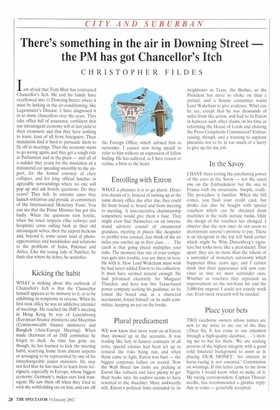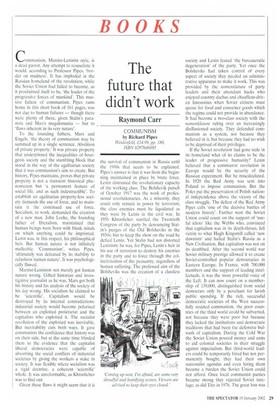There's something in the air in Downing Street the PM has got Chancellor's Itch
CHRISTOPHER FILDES
Iam afraid that Tony Blair has contracted Chancellor's Itch. He and his family have overflowed into 11 Downing Street, where it must be lurking in the air-conditioning, like Legionnaire's Disease. I have diagnosed it in so many chancellors over the years. They take office full of assurance, confident that our intransigent economy will at last yield to their treatment and that they have nothing to learn, least of all from foreigners. Their mandarins find it hard to persuade them to fly off to meetings. Then the economy starts to go wrong again, and they get a rough ride in Parliament and in the press — and all of a sudden they yearn for the insulation of a ministerial car speeding smoothly to the airport, for the formal courtesy of chers collegues, and for long official lunches in agreeable surroundings where no one will pop up and ask hostile questions. Do they yearn? They itch. In extreme cases they launch initiatives and preside at committees of the International Monetary Fund. You can see that the Prime Minister has got this badly. When the questions turn hostile, when the usual suspects (like railways and hospitals) come sidling back as their old intransigent selves, then the airport beckons and, beyond it, some sunny land of photoopportunities and handshakes and solutions to the problems of India, Pakistan and Africa. Like the young lady of Natchez, he finds that where he itches, he scratches.
Kicking the habit
WHAT is striking about this outbreak of Chancellor's Itch is that the Chancellor himself appears to be immune to it, or to be exhibiting its symptoms in reverse. When he first took office he was an addictive attender of meetings. He reached the IMF's meeting in Hong Kong by way of Luxembourg (European finance ministers) and Mauritius (Commonwealth finance ministers) and Bangkok (Asia-Europe Meeting). When made chairman of an IMF committee he forgot to duck. As time has gone on, though, he has learned to kick the meeting habit, scurrying home from distant airports or arranging to be represented by one of his interchangeable junior ministers. He may not feel that he has much to learn from foreigners, especially in Europe, whose biggest economy, Germany's, makes ours look transigent. He saw them off when they tried to wish the withholding tax on him, and saw off the Foreign Office, which advised him to surrender. I cannot now bring myself to refer to him without an expression of fellow feeling. He has suffered, as I have reason to realise, a blow to the heart.
Enrolling with Enron
WHAT a pleasure it is to go plural. Directors dream of it. Instead of turning up at the same dreary office day after day, they could flit from board to board and from meeting to meeting. A non-executive chairmanship somewhere would give them a base. They might even find themselves on an international advisory council of ornamental grandees, meeting in places like Acapulco to proffer wise counsel. Just think of the air miles you ratchet up in first class. . . The catch is that going plural multiplies your risks. The moment that one of your companies gets into trouble, you are there in trouble with it. How Lord Wakeham must wish he had never added Enron to his collection. It must have seemed natural enough. He had privatised electricity for Margaret Thatcher, and here was this Texas-based power company seeking his guidance, so he joined the board and, as a chartered accountant, found himself on its audit committee. keeping an eye on the books.
Plural predicament
WE now know that more went on at Enron than showed up in the accounts. It was trading like fury in futures contracts of all sorts, special entities had been set up to conceal the risks being run, and when these came to light, Enron was bust — the biggest corporate failure on record. Now the Wall Street law firms are pecking at Enron like vultures and have plenty to get their beaks into. Its auditor seems to have resorted to the shredder. More awkwardly still, Enron's political links extended to its
neighbours in Texas, the Bushes, so the President has more to choke on than a pretzel, and a Senate committee wants Lord Wakeham to give evidence. What can he say, except that he was thousands of miles from the action, and had to fit Enron in between such other claims on his time as reforming the House of Lords and chairing the Press Complaints Commission? Embarrassing, though, and a warning to aspirant pluralists not to be in too much of a hurry to give up the day job.
In the Savoy
I HAVE been testing the purchasing power of the euro in the Savoy — not the usual one on the Embankment but the one in France with the mountains. Simple, really. The procedure is familiar. When the bill comes, you flash your credit card, but drinks can also be bought with special vouchers which can be obtained from machines in the walls outside banks. Only the design of the vouchers has changed. I observe that the new ones do not seem to incorporate anyone's promise to pay. There is an ideogram in the top left hand corner which might be Wim Duisenberg's signature but looks more like a pterodactyl. That apart, they are no more than the tokens of a surrender of monetary autonomy which happened three years ago, and I cannot think that their appearance will now convince us that we must surrender ours. Whether as vouchers they represent an improvement on the ten-franc kir and the 3,000-lire negroni I could not exactly work out. Even more research will be needed.
Place your bets
TWO racehorse owners whose names are new to me write to me out of the blue (Dear Sir, It has come to our attention through a high-quality database. . . ') inviting me to bet for them. 'We are seeking persons of the highest integrity with a good solid financial background to assist us in placing OUR MONEY. An interest in horse-racing is not essential.' Commission on winnings. If this letter came to me from Nigeria I would know what to make of it. My racing correspondent, Captain Threadneedle, has recommended a gnomic reply: Any to come — gratefully accepted. Communism, Marxist-Leninist style, is a dead parrot. Any attempt to resuscitate it would, according to Professor Pipes, 'border on madness'. It has imploded in the Russian homeland of the revolution, while the Soviet Union had failed to become, as it proclaimed itself to be, the leader of the progressive forces of mankind'. This massive failure of communism, Pipes rams home in this short book of 161 pages, was not due to human failures — though there were plenty of these, given Stalin's paranoia and Mao's megalomania — but to 'flaws inherent in its very nature'.
To the founding fathers, Marx and Engels, 'the theory of communism may be summed up in a single sentence. Abolition of private property.' It was private property that underpinned the inequalities of bourgeois society and the stumbling block that stood in the way of the egalitarian society that it was communism's aim to create. But history, Pipes maintains, proves that private property is not a transient historical phenomenon but 'a permanent feature of social life, and as such indestructible'. To establish an egalitarian property-less society demands the use of force, and to maintain it the continued use of force. Socialism, to work, demanded the creation of a new man. John Locke, the founding father of liberalism, maintained that human beings were born with blank minds on which anything could be imprinted. Lenin was, in this respect, his philosophical heir. But human nature is not infinitely malleable. 'Communism', writes Pipes, 'ultimately was defeated by its inability to refashion human nature'. It was psychologically flawed.
Marxist-Leninism not merely got human nature wrong. Gifted historian and investigative journalist as he was, Marx got both his history and his analysis of the society of his day wrong. His socialism he claimed to be 'scientific'. Capitalism would be destroyed by its internal contradictions: industrial society would become polarised between an exploited proletariat and the capitalists who exploited it. The socialist revolution of the exploited was inevitable. But inevitability cuts both ways. It gave communists the confidence that history was on their side, but at the same time blinded them to the evidence that the capitalist liberal democracies were capable of absorbing the social conflicts of industrial societies by giving the workers a stake in society. It was flexible where socialism was a rigid doctrine, a coherent 'scientific' whole. It was unreformable, as Khrushchev was to find out.































































 Previous page
Previous page